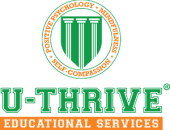Introduction:
Summer bridge programs have gained immense popularity in recent years as a means to support first-generation college students during their transition into higher education. These programs aim to equip students with the necessary skills and knowledge to thrive academically and socially. In a recent Inside Higher Ed article, the benefits of summer bridge programs for first-gen students were explored, along with the positive impact of such initiatives.
This blog post will delve into the key learnings from the article and provide insights on how U-Thrive® strives to support effective and proactive skill-building within summer bridge programs.
1. A Holistic Approach to Skill-Building:
Effective summer bridge programs prioritize a holistic approach to skill building. Academic support, including tutoring, study skills workshops, and access to resources, forms a strong foundation. At U-Thrive, we offer colleges and universities an integrated delivery model that allows them to meet students where they are with our mental and emotional wellness solutions designed to equip students with both the knowledge and skills to navigate the college experience. It is important to extend beyond the academic environment with opportunities for personal as well as professional development. Cultivating effective communication skills, time management, critical thinking, and problem-solving abilities, together with self-compassion, stress management, resilience, and goal setting, are equally essential for achieving long-term success.
2. Customized Support:
Students entering college possess distinct strengths, while also faced with unique challenges based on their life circumstances. Therefore, the implementation of summer bridge programs should be tailored to meet individual needs. Conducting thorough assessments and evaluations at the program’s onset can help identify areas where each student requires additional support. This data-driven approach enables effective skill-building interventions, fostering a proactive learning environment.
3. Mentoring and Peer Support:
Mentoring is an integral element of successful summer bridge programs. Pairing students with mentors who have similar backgrounds, experiences, or shared academic interests can provide invaluable guidance. Mentors can help students navigate the challenges of college life, offer academic and career advice, and serve as a source of motivation and inspiration. Additionally, integrating peer support through group activities, peer-led workshops, and collaborative projects promotes a strong sense of community and encourages skill-sharing among participants.
4. Student Empowerment and Ownership:
To foster effective skill-building, summer bridge programs should empower students to take ownership of their learning journey. Promoting self-advocacy, self-reflection, and goal-setting empowers students to identify their strengths and weaknesses. Encouraging them to actively engage in their academic and personal development enables a proactive approach to skill-building.
5. Continuous Evaluation and Improvement:
Periodic evaluation and feedback loops are crucial to ensure the ongoing effectiveness of summer bridge programs. Assessing the program’s impact on participants’ skill development, academic performance, and post-graduation outcomes can guide necessary improvements. Regular data analysis can help identify patterns, strengths, and areas for growth, allowing program coordinators to make data-informed decisions to enhance skill-building initiatives.
6. Foster a Growth Mindset:
Approach your summer bridge experience with a growth mindset. Embrace challenges and setbacks as opportunities for growth and learning. View constructive feedback as a chance to improve rather than a criticism. Cultivate resilience and perseverance as you encounter new academic rigor and adjust to college life. Remember, the journey is not solely about achieving success but also about developing the skills needed to thrive in challenging environments.
Conclusion:
Summer bridge programs serve as a vital launching pad for first-generation college students, providing them with the necessary tools to navigate the challenges of higher education. By implementing effective and proactive skill-building strategies, these programs can further enhance students’ confidence, academic performance, and social integration. Adopting a holistic approach, customized support, mentoring, peer collaboration, student empowerment, and continuous evaluation are essential elements for creating robust summer bridge programs.
Contact us today to learn how U-Thrive Educational Services is supporting effective and proactive skill building for Summer Bridge Programs. If you missed it, check out our event recording featuring San Jose State University’s EOP Team for great insights from an institution that is committed to the key role they play in student success and thriving.
